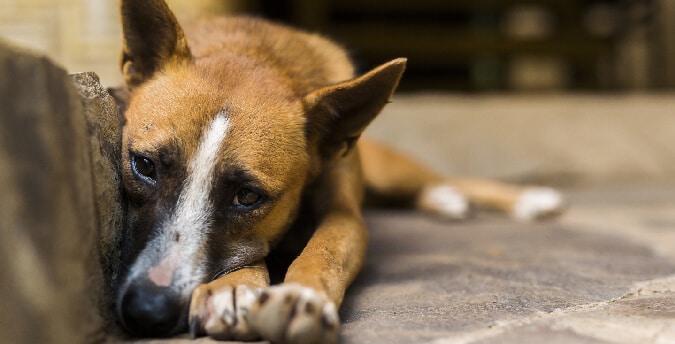My Dog Isn’t Eating–What Should I Do?

What to Do When Your Dog Won’t Eat
There are many different reasons why you may see a loss of appetite in your canine companion, so it’s important to determine the cause in order to design the best treatment plan. The most important thing to consider is how you are gauging their appetite. If you feel like your dog is not eating enough simply because they are not eating the full recommended amount listed on their food bag, do not worry. Many dogs who are completely healthy will eat only around 75% of the food serving that is recommended. The label servings size is a general average, so there is some wiggle room to take into account with regard to size, activity level, and personal quirks of your individual pooch.
However, if your dog suddenly has a change in how much they are eating compared to normal, or they are refusing to eat anything at all, then that is a cause for concern. “When a dog won’t eat, it is referred to as anorexia. This is different from anorexia nervosa, an eating disorder found in humans. Instead, anorexia describes a complete loss of appetite in dogs. Because a loss of appetite in dogs can indicate illness, it is important to seek veterinary care if you notice changes in your dog’s eating habits. It is especially important to respond promptly to a refusal to eat in dogs that usually eat well” (Pet WebMD). Understating the reasons why your dog may not be eating can help you gauge how serious the situation is and what your best course of action would be.
Reasons Your Dog Won’t Eat
Just like with people, every dog is different and has different likes and dislikes and quirks. It is important to remember that there are a variety of reasons dogs might refuse to eat, and it is necessary to consider each one to see if it is a probable cause. These include:
Illness
A decreased appetite in dogs is often a sign of sickness, especially when other symptoms are also present, such as a change in energy levels, sleepiness, eye or nose discharge, or any other troubling signs. Although a loss of appetite in dogs doesn’t necessarily indicate serious disease, it is imperative that your dog is checked by a vet so that they can rule out any significant illness, including cancer, infections, injuries, liver problems, and kidney failure.
Dental Disease
Many dogs experience some kind of dental issue during their lifetime. The older your dog is, the better the chances are that they will have an issue with their teeth or gums at some point, and this can affect their eating habits. Your dog may not want to eat because something in its mouth is causing it pain. Things like a broken tooth, a missing tooth, gum disease, abscess infections, and even tumors can cause dental pain and make your dog want to not eat.
Recent Vaccination
Fortunately, vaccinations are available for many serious and contagious dog diseases. Millions of pets are saved and spared painful and deadly illnesses thanks to vaccines. However, on rare occasions, some dogs can have side effects from the vaccines, and this can include loose teeth, swollen gums, or pain in the mouth area. The most common side effect seen is a loss of appetite. Thankfully, the majority of these cases are minor and brief, lasting only a day or two following the vaccination, with no long-term ill effects.
Travel and Unfamiliar Surroundings
If your dog’s appetite was fine but then you took them on a long trip to visit relatives or you have left them with a friend to watch while you are gone, the change in appetite may be due to unfamiliar surroundings. Some dogs do not feel like eating when their routine is different or when they are in new surroundings. Some animals may get motion sickness, and others become nervous or uncomfortable in new places.
Pickiness or Behavior Issues
Some dogs are just picky, may be acting out for some reason, or may be testing you. Because a decreased appetite in dogs may be caused by illness, never assume that your dog is picky without investigating other possibilities first. If an illness has been ruled out, then proceed assuming it is a behavior related issue and talk to your vet about how to overcome it quickly and without causing more harm to your furry companion.
